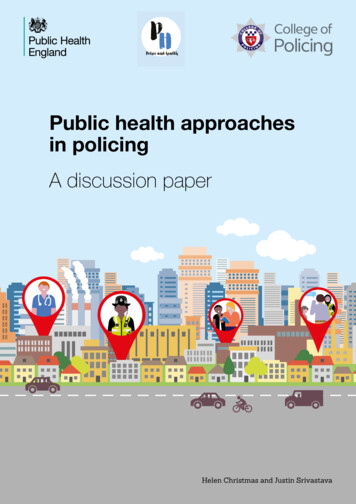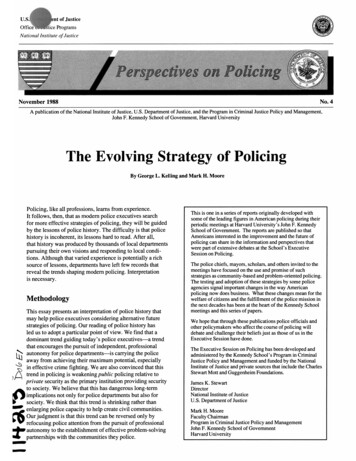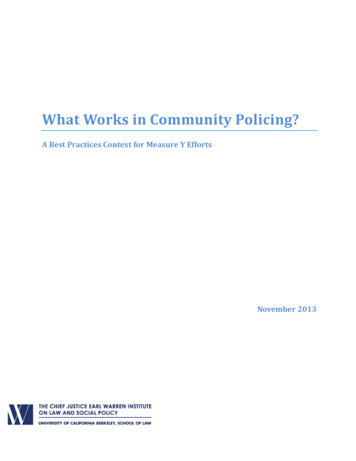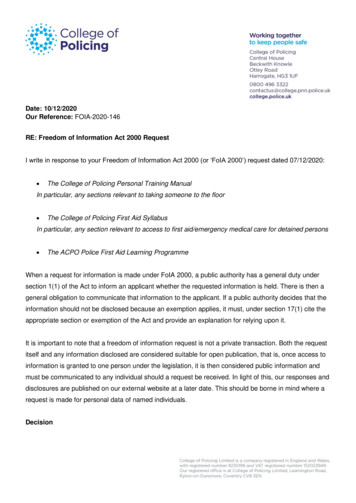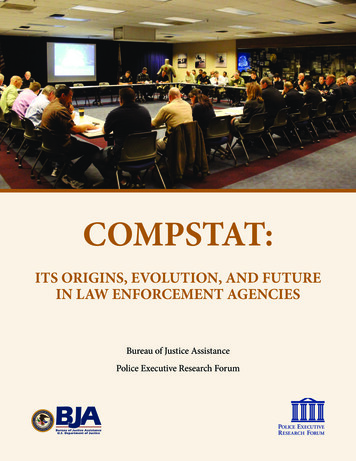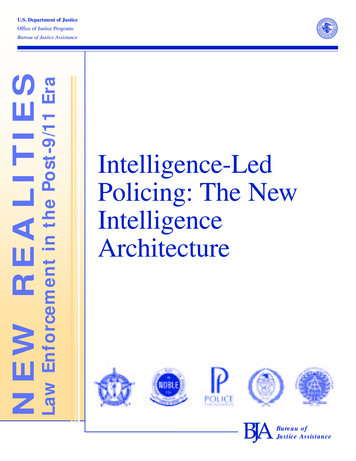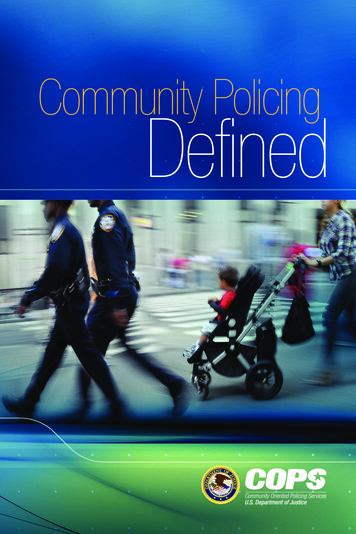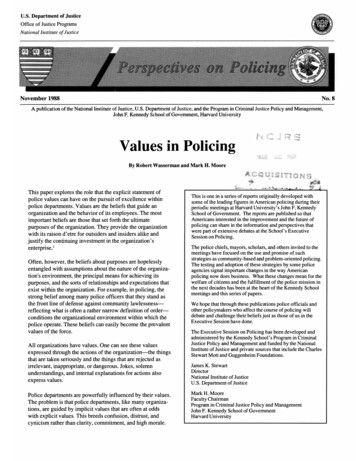
Transcription
U.S. Department of JusticeOffice of Justice ProgramsNational Institute of JusticeNo. 8November 1988A publication of the National Institute of Justice, U.S. Department of Justice, and the Program in Criminal Justice Policy and Management,John F. Kemedy School of Government, Harvard UniversityValues in Policingis-- *,"-'-7./aBy Robert Wasserman and Mark H. MooreThis paper explores the role that the explicit statement ofpolice values can have on the pursuit of excellence withinpolice departments. Values are the beliefs that guide anorganization and the behavior of its employees. The mostimportant beliefs are those that set forth the ultimatepurposes of the organization.They provide the organizationwith its raison d'etre for outsiders and insiders alike andjustify the continuinginvestment in the organization'senterprise.'Often, however, the beliefs about purposes are hopelesslyentangled with assumptions about the nature of the organization's environment,the principal means for achieving itspurposes, and the sorts of relationships and expectations thatexist within the organization.For example, in policing, thestrong belief among many police officers that they stand asthe front line of defense against community lawlessnessreflecting what is often a rather narrow definition of orderconditions the organizationalenvironment within which thepolice operate. These beliefs can easily become the prevalentvalues of the force.All organizations have values. One can see these valuesexpressed through the actions of the organization-the thingsthat are taken seriously and the things that are rejected asirrelevant, inappropriate,or dangerous. Jokes, solemnunderstandings, and internal explanations for actions alsoexpress values.Police departmentsare powerfully influenced by their values.The problem is that police departments, like many organizations, are guided by implicit values that are often at oddswith explicit values. This breeds confusion, distrust, andcynicism rather than clarity, commitment, and high morale.This is one in a series of reports originally developed withsome of the leading figures in American policing during theirperiodic meetings at Harvard University's John F. KennedySchool of Government. The reports are published so thatAmericans interested in the improvement and the future ofpolicing can share in the information and perspectives thatwere part of extensive debates at the School's ExecutiveSession on Policing.The police chiefs, mayors, scholars, and others invited to themeetings have focused on the use and promise of suchstrategies as community-based and problem-oriented policing.The testing and adoption of these strategies by some policeagencies signal important changes in the way Americanpolicing now does business. What these changes mean for thewelfare of citizens and the fulfillment of the police mission inthe next decades has been at the heart of the Kennedy Schoolmeetings and this series of papers.We hope that through these publications police officials andother policymakers who affect the course of policing willdebate and challenge their beliefs just as those of us in theExecutive Session have done.The Executive Session on Policing has been developed andadministered by the Kennedy School's Program in CriminalJustice Policy and Management and funded by the NationalInstitute of Justice and private sources that include the CharlesStewart Mott and Guggenheim Foundations.James K. StewartDirectorNational Institute of JusticeU.S. Department of JusticeMark H. MooreFaculty ChairmanProgram in Criminal Justice Policy and ManagementJohn F. Kennedy School of GovernmentHarvard University
Values in the private sectorHigh-performing corporations, theelite of American industry, have onething in common. They operate with acore set of values that guides conductthroughout the organization. Companies such as Federal Express, GoreTex Fabrics, and Digital EquipmentCorporation have all developedexplicit corporate values that not onlydefine excellence for the enterprise,but also help to achieve it.Take Federal Express. At the broadestlevel, the goal is to earn returns forshareholders. More concretely, theobjective is to get packages wherethey are going on time. In additionto these substantive goals, FederalExpress has values that definerelationships within the company andits markets. These values are: (1)totreat each customer and each transaction as though the entire success of thecorporation rested on that transaction;(2) to make the workplace a satisfyingenvironment for employees; and (3) tokeep employees informed aboutcompany policy. Every FederalExpress employee knows these values.Federal Express succeeds because allemployees acknowledge them andunderstand that their survival in thecorporation rests on embodying thevalues in their actions.in the design of new products andproduction technologies, and thecultivation of a "worker-positive"workplace. The differences in valuesreflect the differences in theirproducts. However, both companiesshare the explicit statement andemphasis on values as an importantmanagement tool. Management ofthe corporations believes that workersare pressed toward excellence notby autocratic direction but rather bymanagement through values, creatinga sense of purpose, direction, andperformance that is uniform throughout the organization.At Gore-Tex, the values are somewhatdifferent. They emphasize the production of high-quality material, creativityAlmost as bad, the explicit values articulated by some policeorganizations are unsuited to the challenges confrontingtoday's police departments. Finally, there is a reluctance onthe part of some police executives to rely on explicit statements of values as an important management tool forenhancing the performance of their organizations. Still, somepolice executives are working towards superior policeperformance by articulating a new set of values, and by usingthese as a primary management tool.6 6 . .police departments, like manyorganizations, are guided by implicitvalues that are often at odds withexplicit values. f f"Value orientation" has been neither the driving force nor thebasis of organizational life in American policing. Should theAmerican police organization have a set of organizationalvalues that are explicitly acknowledged and well knownthroughout the organization? Should police officers recog-nize that their survival in the police department rests onwhether they embody these organizational values in theiractions? This paper examines these questions.How are values articulated or expressed? Some organizations state their values directly to clientele or employees.Even so, customers, clients, and organizational authorizers(community residents, mayors, and city council members inthe municipal setting, and bankers and institutional investorsin the corporate sphere) become aware of an organization'svalues only through the actions of members of the organization or the work of public relations officials.American corporations are far more sophisticated incommunicating values than are government organizations.In industry, values often are expressed through corporatevalue statements, public advertising, and managementpronouncement . Yet, while public relations may createan illusion that a particular set of values is important to thecorporation, actual consumer experience often determineseventually the true nature of the corporation's values.There is often a disparity between the values explicitlyestablished by an organization and those that are actuallyembraced and pursued. In such cases, corporate managementfocuses on one set of values while employees adopt anentirely different set. This occurs either because of the failureof management to communicate organizational values or
because stated organizational values fail to take into accountthe reality of the workplace.The disparity is particularly common in American policing.Mayors and city managers often give their police executivesa dual set of objectives, such as "clean up the gangs in thepark" and "don't break the law in doing it." Since cleaningup the park has primary importance, and the police are unsupported in developing tools and tactics necessary to solvethe underlying problems creating the situation, the mayoralconcern with "don't break the law" implicitly becomes "don'ttell me about it if you must break the law."Major corporations have had to deal with the same pressuresand ambiguities. In the case of a large producer of orangejuice, maintaining profitability was translated by midlevelmanagerial employees as being more important than productquality, thus making it acceptable to water down the juice aslong as it went undiscovered.66. . . the mayoral concern with 'don'tbreak the law' implicitly becomes 'don't tellme about it ifyou must break the law.'))In many organizations, values are taken for granted until acrisis centers public attention on the disparity between theorganization's stated values and those actually pursued.High-performing commercial organizations consciouslystrive to ensure that values expressed by employee actionsand comments match the values of the organization. Manyother organizations, however, function with a dual standardof public relations pronouncements and actual workplacevalues.Values as a management tool. The explicit statement andfrequent pronouncement of organizational values becomesan important management tool in three circumstances: first,when management's explicit values are so well incorporatedin the administrative systems and culture of an organizationthat they become workplace values; second, whenmanagement's values seem well suited to the challenges andtasks facing the organization, and their pursuit will lead toorganizational success; and third, when the organization'soperations are such that management through values issuperior to any other kind of management control.Values play this important role for several reasons. To theextent that the values actually influence substantive andadministrative decisions facing the organization, they lend acoherence and predictability to top management's actionsand the responses to the actions of employees. This helpsemployees make proper decisions and use their discretionwith confidence that they are contributing to rather thandetracting from organizational performance. That means thatthe necessity for strong control is lessened. Explicit valuesalso lend significance and meaning to the activity of employers. They transform small transactions and events intoexpressions of personal commitment to particular values.Finally, explicit statements of values invite broad publicsupport and facilitate accountability. To the extent that thevalues are attractive to shareholders, customers, and employees in the private sector, and to constituents, clients, andemployees in the public sector, a flow of resources to theorganization is initiated. To the extent that the values areactually expressed in organizational actions, accountability ispreserved, and the flow of resources ustained. Note that management through values is a particularlyimportant tool for organizations that find it difficult to codifyprocedures or measure their performance. This occurs inorganizations where outputs are hard to define, adaptationsof operations to individual cases are often necessary, andtechnical innovations are occumng. It also occurs in organizations where operations make close supervision impossible.The reason is that in such organizations, the principalalternative methods of control are obviously infeasible.Values in policing. Policing styles reflect a department'svalues. A police agency that independently adopts anaggressive tactical orientation has a far different set of valuesthan a police agency that carefully engages neighborhoodresidents in planning for crime control activities. The valuesinherent in policing before the reform efforts of the 1930'soften reflected political and personal priorities of employeesor special interest groups rather than a commitment to broadprinciples of professionalism.Sometimes the values of police organizations have beenpublicly stated. O.W. Wilson, for example, published a set ofvalues for the Wichita Police Department when he was thatcity's chief of police; he did the same for Chicago when heserved as that city's police uperintendent. It is more usual,however, for the values that drive policing to be unstated. Anumber of police agencies, such as Los Angeles, havecarefully incorporated values into their rules and proceduraldirectives. Other police agencies, such as Madison (Wisconsin) and Houston, have articulated individual value statements reflecting organizational commitments.Much of the current discussion about improving policeperformance is concerned about the values that should guidepolicing. To understand that discussion, it is useful tocontrast the values of professional crime-fighting policingwith the values of community problem-solving policing.
The values of professional crime-fighting policing. Overthe last four decades, as police departments have becomeincreasingly professional, several key values have emergedto justify and guide the performance of police agencies.While often unstated, these values include the following:Police authority is based solely in the law. Professional police organizations are committed to enforcement of that law as their primary objective.Communities can provide police with assistance inenforcing the law. Helpful communities will providepolice with information to assist them (the police) incarrying out their mission.Responding to citizen calls for service is the highestpolice priority. All calls must receive the fastestresponse possible.Social problems and other neighborhood issues arenot the concern of the police unless they threaten thebreakdown of public order.Police, being experts in crime control, are best suitedto develop police priorities and strategies.6 6 [In professional crime-fightingpolicing] police authority is basedsolely in the law. 9 )Other values reflect the common belief among police officers(and some chief police executives) that police departmentsexist to advance the profession of policing, not to serve as animportant part of maintaining democratic values and improving the quality of life in urban communities. From theseperspectives, there is little interest in, or respect for, thecommunity basis for police authority.The values of community policing. In the ongoing dialogabout community policing, there are two important newdevelopments. A number of chiefs of police have defined aset of values reflecting internal (employee and administration) and external (community and government) consensusabout the nature of the police function and operation of thepolice agency.Second, from the discussion of values, these chiefs havediscovered that communities are more thoughtful andreceptive to discussion of police priorities and strategies ifthat discussion occurs within the context of mission andvalue considerations. No longer is the chief of policeconsidered out of place when he suggests to his communitythat public consideration of policing values and standards isin order. The experience of these chiefs has shown that thedevelopment of value statements can be illuminating to boththe community and members of the police department.66. . .communities are . receptive.to discussion of police priorities .within the context of mission and valueconsiderations. )fIn 1982,for example, Lee P. Brown, Houston's chief ofpolice, made public a statement of the values of the HoustonPolice Department. This statement set forth the commitmentsof the police department in several critical areas such aspolicymaking, community access to decisionmaking,standards of integrity, and field strategy development. AsChief Brown noted, the statement established the criteria forevaluating the performance of the department.The value statement for the Houston Police Departmentincludes the following:The Houston Police Department will involve thecommunity in all policing activities which directlyimpact the quality of community life.The Houston Police Department believes thatpolicing strategies must preserve and advancedemocratic values.The Houston Police Department believes that it muststructure service delivery in a way that will reinforcethe strengths of the city's neighborhoods.The Houston Police Department believes that thepublic should have input into the development ofpolicies which directly impact the quality of neighborhood life.The Houston Police Department will seek the inputof employees into matters which impact employeejob satisfaction and effectiveness.By publicly stating values, the beliefs underpinning organizational actions, Chief Brown wished to have both thecommunity and the police department focus on importantissues of police authority, standards, and operational limits.Indeed, he believed public acknowledgment of communityoriented values was an important step in his move to change
the culture of the Houston Police Department from a defensive orientation designed to protect internal organizationalpatterns to an externally directed community-positiveorientation.The developing emphasis on community policing hasgenerated a substantial amount of discussion about valuesbecause, by definition, community policing reflects a set ofvalues, rather than a technical orientation toward the policefunction. It reflects a concern with the quality of policeservice delivery, the relationship between the police and thecommunity, and the relationship within the police agencybetween management and employees. As opposed to themore traditional perspective of professional crime-fightingpolicing which emphasizes the maintenance of internalorganizational controls, community policing emphasizesservice output, the quality of results, and the impact ofpolice service on the state of urban living.44.by definition, community policingreflects a set of values, rather than atechnical orientation . 9)There have been several examples of values that reflect thisorientation. In Boston, Commissioner Francis M. Roachehas set forth the following commitment for the policedepartment:The department is committed to the positive evolution, growth, and livability of our city.Sir Kenneth Newman, former Commissioner of theMetropolitan Police in London, England, set forth thefollowing values for that department:In pursuing the aim and duty of maintaining apeaceful community, members of the MetropolitanPolice view their role as one involving cooperationwith others in the creation and maintenance of a wayof life in communities which strikes the optimumbalance between the collective interests of all citizensand the personal rights of all individuals.The aim of the Metropolitan Police will, therefore, beto work with other agencies to develop what isknown as a "situational" or "problem-solving"approach to crime prevention.Discussions of the Executive Session on CommunityPolicing at Harvard University's John F. Kennedy School ofGovernment have produced a set of values that represent thekey characteristics of community policing. These characteristics are embodied in the following principles:Community policing is committed to a problemsolving partnership: dealing with crime, disorder, andthe quality of life.The value here is the orientation toward problem solving. Incommunity policing, incidents (such as crime or 91 1responses) are viewed from the perspective of communityaction which will seek to resolve the problem, not simplyhandle the incident.Under community policing, police service delivery isdecentralized to the neighborhood level.Community policing holds that policing a city's neighborhoods is best done at the individual neighborhood level, notby centralized command and control. Since the solutions tomost neighborhood problems are through neighborhoodaction, the community policing effort concentrates ondeveloping a cohesive neighborhood capability reflectingresponsibility, self-help, and co-production of service withthe police. The value of decentralization suggests that everypolice effort is pushed down toward the neighborhood levelunless there is a specific reason for the effort to be centralized, such as a concern with a citywide problem or issue.The highest commitment of the community policingorganization is respect for and sensitivity to allcitizens and their problems. Community policingvalues the skills of positive social interaction, ratherthan simply technical application of procedures tosituations, whether dealing with crime, disorder, orother problem solving.64Communitypolicing holds thatpolicinga city's neighborhoods is best done at theindividual neighborhood level, not bycentralized command. . )).As is the case with several notable private sector companies,community policing's officers have a service orientation.Citizens are supposed to be treated with respect, regardlessof the involvement of the citizens in the incident to whichthe police are responding.Police officers often find this value difficult to accept. Thereis a widespread tendency to think of, and describe, street
criminals as maggots and other, even less endearing terms.With a service orientation, such characterizations areavoided, if for no other reason than recognition that theinitial police contact may erroneously describe the truenature of the individual.The community-orientedpolice department makesthe highest commitment to collaborative problemsolving, bringing the neighborhoods into substantivediscussions with police personnel to identify ways ofdealing with neighborhood problems.44. . constructive action by policeandcommunity is always better than action bythe police alone.9.9The community-oriented police department recognizes thatconstructive action by police and community is always betterthan action by the police alone. Before any major action isundertaken, whether a shift in resources or implementationof a new problem-solving approach, the community-orientedpolice department discusses that change with the appropriateneighborhood. The willingness to discuss publicly prioritysetting or selection of problem-solving tactics reflects thehigh value the organization places on bringing the community into the business of policing. It is also recognition thatthe community is an important source of police authority.Robert Wasserman is a Research Fellow in the Program inCriminal Justice Policy and Management . Mark H. Moore isDaniel and Florence Guggenheim Professor of Criminal JusticePolicy and Management, John F. Kennedy School of Government,Harvard University.Points of view or opinions expressed in this publication are thoseof the authors and do not necessarily represent the official positionor policies of the U.S. Department of Justice or of HarvardUniversity.The Assistant Attorney General, OfSice of Justice Programs, coordinates the activities of thefollowing program Ofices and Bureaus:National Institute of Justice, Bureau of Justice Statistics, Bureau ofJustice Assistance, Office of Juvenile Justice and DelinquencyPrevention, and Officefor Victims of Crime.The community-oriented police department viewsboth the community and the law as the source of thedepartment's authority.Since police action is not prescribed by the law, the community empowers the police agency to deal with difficultproblems of importance to neighborhood residents andaccepts the actions taken as long as the police are continuallycareful to engage the neighborhood in selecting tactics andpriorities beyond those set forth under the law. When apolice agency has lost its community authority, a range ofresponses always occurs, from widespread dissatisfactionwith the department to substantial disorder when the policeapply the law in the neighborhood.The community-oriented police agency is committedto furthering democratic values. Every action of theagency reflects the importance of protecting constitutional rights and ensuring basic personal freedoms ofall citizens.The commitment to democratic values is a cornerstone ofcommunity policing. Placement of a high value on thedemocratic process provides police agencies with the shieldthey need to ensure that actions proposed by communitiesdo not infringe on others' rights. Embodiment of thisvalue by the organization, and its use as a defense againstinappropriate neighborhood initiatives, will succeed only ifthe police themselves strictly adhere to the law in all aspectsof their work.Implementing values. While a number of police agencieshave set forth written statements of their values, few havecarefully considered ways of implementing their values sothat the actions of agency employees will match the valueorientation of the organization.Police departments that have adopted the communitypolicing philosophy have found it helpful to develop concisevalue statements that reflect these principles and commitments. The philosophy then can be understood throughoutboth the department and the community, and serve as thebasis for the application of discretion within the department.Written value statements are useful if for no other reasonthan to force management to reach agreement on theorganization's values. Experience in most police agenciesindicates that this debate is not an easy task. But writtenvalue statements are not sufficient, since the values eventually must be reflected in all aspects of the organization, fromtraining to field operations.
66 Written value statements are usefuli f for no other reason than to forcemanagement to reach agreement on theorganization's values. ))Presenting values through training must involve more thansimply handing out value statements, as has occurred insome agencies. Carefully developed case materials, classdiscussion, tests, and field officer programs must all reflectthe official values of the agency. Policy statements not onlystate the values explicitly but also provide explanations ofthe reasoning behind the derived policies.When auditing field operations or investigative performance,the review must include careful consideration of the degreeto which the actions follow stated department values. Whenriding in police cruisers, supervisors and managers mustlisten for the "talk of the department" to see if values expressed by police officers reflect those of the department.values. . .match those . . [ofl the rank andfile can the organization b e . . .'high performing.'))Notes1. In describing the characteristics of organizations, Peters andWaterman note that excellent companies "are fantastic centralistsaround the few core values they hold dear." Thomas J. Peters andRobert H. Waterman, Jr., In Search of Excellence, New York,Harper & Row, 1983: 15.2. Thomas J. Watson, Jr., the founding father of IBM, authored anearly work about how values must be articulated by the successfulcorporation. See Thomas J. Watson, Jr., A Business and its Beliefs:The Ideas that Helped Build IBM, New York, McGraw Hill, 1963.3. See George L. Kelling, "Police and Communities: the QuietRevolution," Perspectives on Policing, No. 1, Washington, D.C.,National Institute of Justice and Haward University, June 1988; andGeorge L. Kelling, Robert Wasserman, and Hubert Williams,"Police Accountability and Community Policing," Perspectives onPolicing No. 7 ,Washington, D.C., National Institute of Justice andHarvard University, November 1988, for a discussion of howmanagement through values lessens the need for reliance on strongcommand and control systems.4. Wilson published the values to provide both the police and thecommunity with an understanding of why the police departmentundertook many of its actions. See Orlando W. Wilson, On This WeStand, Chicago Police Department, 1983.6 6 . .only when the formalSome police administrators will claim that officers will nevermatch the values articulated in their street talk with those ofthe organization as it pursues excellence. That, of course, isthe greatest challenge the police administrator faces; for onlywhen the formal values of the organization match those actedout by the rank and file can the organization be considered"high performing." Community policing requires that matchof values; it provides a structure and orientation that makesuch a match easier.The Executive Session on Policing, like other ExecutiveSessions at Haward's Kennedy School of Government,is designed to encourage a new form of dialog betweenhigh-level practitioners and scholars, with a view toredefining and proposing solutions for substantive policyissues. Practitioners rather than academicians are givenmajority representation in the group. The meetings of theSession are conducted as loosely structured seminars orpolicy debates.Since it began in 1985, the Executive Session on Policinghas met seven times. During the 3-day meetings, the 31members have energetically discussed the facts and valuesthat have guided, and those that should guide, policing.Summary.The values of community policing are differentfrom those of previous eras in police history. Equallyimportant, values are no longer hidden, but serve as the basisfor citizen understanding of the police function, judgments ofpolice success, and employee understanding of what thepolice agency seeks to achieve.NCJ 114216U. S. GPO:1989-241-714/80026
The Executive Session on Policingconvenes the following distinguished panel of leaders in the field of policing:Allen AndrewsSuperintendent of PolicePeoria, IllinoisRobert R. Kiley, ChairmanMetropolitan Transportation AuthorityNew York, New YorkFrancis Roache, CommissionerBoston Police DepartmentBoston, MassachusettsCamille Cates Barnett, Ph.D.Director of Finance and AdministrationHouston, TexasRobert B. Kliesmet, PresidentInternational Union of Police AssociationsAFLCIOWashington, D.C.Michael E. Smith, DirectorVera Institute of JusticeNew York, New YorkCornelius Behan, ChiefBaltimore County Police DepartmentBaltimore Coun
some of the leading figures in American policing during their periodic meetings at Harvard University's John F. Kennedy School of Government. The reports are published so that Americans interested in the improvement and the future of policing can share in the information and perspectives that were part of extensive debates at the School's Executive
